Blog
23 Ways To Break Writer’s Block
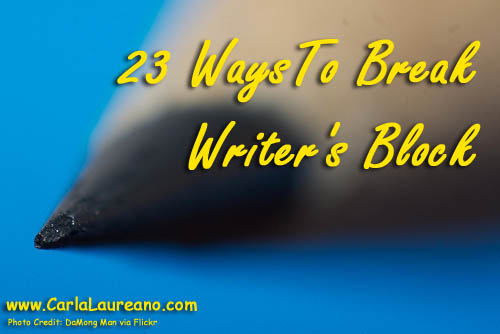
Every writer has been there: the words are flowing, the story is gelling, and then all of a sudden—nothing. Like the faucet has been turned off, or the river has been dammed upstream. You tell yourself not to panic, but as hours pass, especially if you’re under deadline, panic begins to build. What happens next? What if you can’t finish the story?
Rational or not, almost every writer has been struck with a case of writer’s block (except those who claim not to believe it exists, but I’m going to write them off as superhumans who live in a perfect world). I have my favorite go-to solutions for the problem, but because everyone is different (and because when I’m under deadline, getting friends to help me write a blog post is just good sense), I polled a group of writers for their favorite solutions to the dreaded blockage. Here are my favorite ideas out of the hundreds that were suggested:
- Set a timer and don’t let your pen (or typing fingers) stop for the set amount of time, even if you’re writing “I don’t know” over and over, until something clicks in. Or write [the problematic scene] from a different character’s POV. (Katherine Goodman)
- I do dishes. It keeps my hands busy, but my mind is still in writer land. Other times I play piano. Same reason. (Susie Finkbeiner)
- Listen to a song on repeat that represents your WIP. Prewrite your scene in longhand. (Dawn Crandall)
- Take a quick break, whether it’s to read a book by a really great writer or watch a TV show or movie you love. Change location. (Cara Putman)
- Get out a yellow legal pad and start writing by hand and see what comes to the surface. (Carrie Turansky)
- Read, read, read. (Jolina Petersheim)
- Research the subject. Read another book on the subject. Ask a friend to critique. Talk to someone who knows something about it. Fiction or nonfiction, it will eventually shake something loose. (Steven Hutson)
- Take a walk with [your] camera while listening to podcasts. (Lucille Zimmerman)
- Reading a good book, watching another artist create a story, is the best way to break writer’s block. Nothing like inspired writing to inspire writing. (Mike Duran)
- Write anyway. (Jessica Tescher Thomas)
- Switching from 1st to 3rd POV. Skipping ahead in the story. Going to the movies. Reading non-fiction or poetry. Taking a walk. Pacing. And of course there’s always the tough-love approach of just making myself sit down and write no matter how terrible what comes out of my fingertips seems. (Rachel Phifer)
- Clean house. (Casey Miller)
- Getting away from it and thinking about something else. So I go to the movies or go hiking, or I do laundry. (Kristin Billerbeck)
- I close my eyes and write with headphones in (to get rid of the editor in me). Or, if I’m on a desktop, I’ll write with the screen turned off. It’ll still type on Word, even if the monitor is off. Keeps me from getting distracted. (Janette Foreman)
- Best ever: pen and paper to stop the constant editing. Must be a nice pen that flows (Uniball) and beautifully thick paper that reminds me of a fine book. (Tamara Leigh)
- Dark chocolate! (Sandy Nadeau)
- M&Ms work too! (Davalynn Spencer)
- I tear up and reupholster furniture. No really. I do. (Amy Sorrels)
- Break pattern and just write a really good kissing scene, even if it doesn’t fit where the characters are in the story now, you can use it later. Maybe. If not, you still wrote a really good kissing scene. (Serena Chase)
- My time to write is so limited, writers block is panicked out of me. (Peter Leavell)
- Art journaling. Or blow something up. (Danica Favorite) [My note: I can only assume she means in the story. Please do not send the bomb squad.]
- Play with a Slinky. Seriously, one editor at Writer’s Digest swore by it. (Bonnie Doran)
- Set my phone timer and start writing. I can’t check the net or any distractions. Just write no matter what comes out. (Jason Joyner)
Hopefully these tips will help you the next time the blinking cursor is staring you down. Now it’s your turn to share. What’s your favorite tip for breaking writer’s block?
Tags: productivity, writers block, writing life
Interview with Author Ronie Kendig
I’m thrilled to welcome my friend and award-winning military fiction author, Ronie Kendig, to my blog today! I first met Ronie online, then in person at the ACFW conference, but it wasn’t until a few months ago that I cracked open my first book of hers. Let it suffice to say I devoured almost her entire backlist in the matter of a month. Count me a fan! Now Ronie is back to talk about her recent release, centering around a different sort of four-legged hero.
Carla: Welcome, Ronie! Beowulf is the third book in your “A Breed Apart” series, all surrounding military working dogs and their handlers. How did you come across this topic and why did you decide to create a series around it?
Ronie: Last year, a dear friend forwarded an email with an incredible story about a military war dog who had miraculously saved his handler from a POW camp in Iraq. Enthralled with the story and being an author of military stories, I had to check out the story. I quickly learned the story was a hoax, but that research threw me onto the path of a new breed (ahem, pardon the pun) of warriors—military war dogs!
Carla: I happen to know that you’re in the process of adopting an MWD yourself. Can you tell us a bit about that? Most people don’t know that retired working dogs need homes after their tours of duty are over.
Ronie: It’s incredible and awesome to even have this opportunity to adopt a retired military working dog because before 2000, all MWDs were put down. I applied April 2013 to adopt and the wait is approximately 12-18 months. They also will not adopt to families with children 8 or under because of the nature of these dogs and the unpredictability of small children.
I’m blessed to have interviewed and talked to a lot of people in the MWD community, so my application is going a little faster than normal. But first, you fill out an application and turn it. They give you confirmation that they’ve received it. . .and then you wait, and wait, and wait some more. We were in talks with Fort Bragg in November for a possible dog, but he was blessed to be adopted by a former handler. Then our application process swung to Lackland Air Force Base (San Antonio) where the vast majority of MWDs are trained and many are bred there, too. It was at this stage that the adoption coordinator informed us we had to have a fence, so we had to wait another month while we got the funds and had the fence installed.
Now, we’re just waiting for “the call” to come. I’m praying sometime in January I will be able to meet the four-legged warrior who’ll become a part of our family. These dogs are usually older dogs (upwards of 6 years old) and tend to have medical concerns. Adoption is not for placement of a highly trained dog into a working home, but of a family to provide a loving environment for the four-legged hero to live out his/her last years.
Carla: Would you tell us in your own words what Beowulf is about?
Ronie: Beowulf is about the unlikeable girl and the only guy willing to take on her “No-men-allowed” mantra. It’s about a beast of a dog who will protect his girl at all costs—against enemies foreign and domestic (and yes, that includes Candyman, the hero). It’s about facing the brutal reality of war that sometimes results in bodily injuries, mental injuries, and death. It’s about what you do when life hands you a bottle of acid that could eat your life and heart away.
Carla: Since this is the third book in the series, can readers comfortably start here, or should they read Trinity and Talon first?
It’s inevitable that readers might feel a little lost stepping into the established waters of the “A Breed Apart” series. By not reading the first two books (Trinity and Talon), readers will miss a lot of nuances from previous storylines—and they’ll miss the build-up to Timbrel and Tony’s story.
That said, the story does stand on its own. The plot is not directly tied to the previous two novels, so readers should be okay for the most part.
Carla: What can we expect next from you?
Ronie: I am currently working on book 2 in the “Quiet Professionals” series, Hawk, and it’s a really fun surprise in that the Special forces team called ODA452 that readers meet in the “A Breed Apart” books returns for their own series. The first novel, Raptor 6, will release May 2014.
Carla: I, for one, can’t wait to read this series as well as Raptor 6! Thank you for joining us today.
About Ronie
Ronie Kendig is an award-winning, bestselling author who grew up an Army brat. After twenty-plus years of marriage, she and her hunky hero husband have a full life with four children and a Maltese Menace in Northern Virginia. Author and speaker, Ronie loves engaging readers through her Rapid-Fire Fiction novels. Ronie can be found at www.roniekendig.com.
Connect with Ronie: Web | Facebook | Twitter | Goodreads
 About Beowulf
About Beowulf
Beowulf—a hulky, brindle-coated bullmastiff—is the only “boy” for Timbrel Hogan. And she has a history to remind her why. But when Timbrel, a handler at A Breed Apart, embarks on a mission to detect WMDs in Afghanistan, she reunites with Tony “Candyman” VanAllen and her no-other-man philosophy is challenged. While tension mounts between Timbrel and Tony, the team comes under fire after Beowulf gets a “hit.” When tragedy threatens Tony’s career and Timbrel’s courage, they must maneuver through an intricate plot and a mission like no other. . . .
Starting today, U.S. residents may enter to win an awesome prize package, which will include a copy of Ronie’s new book Beowulf, as well as Starbucks and Amazon gift cards, and lots of fun swag from my interviewees all winter long! You can get another entry by commenting on each new post, so don’t forget to check back each Wednesday for another opportunity to win! (Easiest way to remember is to have it delivered directly to your inbox by signing up on the sidebar to the right… just an idea. 🙂 )
***Contest is now closed***
Tags: Beowulf, Military Working Dogs, Ronie Kendig
5 Things No One Will Tell You About Being Published
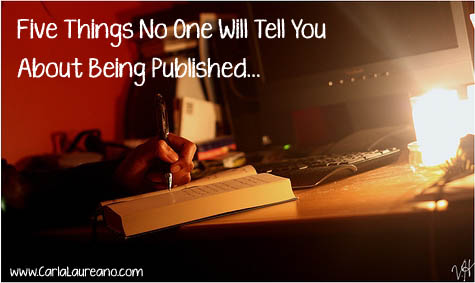
2013 was a pretty amazing year for me. My first novel, Five Days in Skye, was published, and I made the official jump from aspiring/contracted writer to actual author. With it came an inside look into the mysterious world of “being published.” But what I found was not what I expected.
Let me draw back the curtain on the five biggest “secrets” no one will tell you about the publishing world.
1. Being published is every bit as awesome as you think.
When I went to my first writer’s conference as an unpublished writer, I was a little bit in awe of my favorite authors. I begged introductions from friends who knew them, just so I didn’t have to look like a stalker when I went up and greeted them. (If you’ve seen me at a recent ACFW conference, you’ll notice I’ve gotten over that concern… I’ll go talk to anyone.) But at the time, published authors seemed to be so untouchable. They’d achieved the dream I’d been working toward for over a decade. But when I’d talk to them—often gushing over their most recent masterpiece—they would brush it off. “Oh thank you, it was really fun to write. Yes, it’s been a great journey.” I couldn’t quite figure out if they were just being humble or what.
Yeah. They were. Because now that I’ve had my first book released, I can tell you that it really is awesome. There’s nothing like seeing good reviews go up on Amazon, seeing your book make top 100 lists, or having readers write you and because they enjoyed your story. It’s just that published authors were unpublished authors at one point, and it feels really stuck-up and insensitive to say, “I know, right? Didn’t my publisher do an awesome job on the cover? It’s so cool to work for [insert publishing house here].”
But there’s a flip side to that coin, and it goes something like this…
2. Being published is way less glamorous than it seems.
Okay, I was prepared for being published not to be all fun and games. I didn’t think I would be doing radio interviews or talking to Katie Couric on TV. But I didn’t anticipate how much work was involved in getting a book to press.
After you’ve turned it in, there are macro edits (in which you sit and cry in front of your computer because your developmental editor doesn’t like what you thought was an awesome plot twist), followed by line edits (in which you sit and cry in front of your computer because your line editor thinks your clever turns of phrase are cliche), capped off by copyedits (in which you probably cry because you are so darn sick of this book you’d really just rather light it on fire with a blowtorch.)
Depending on your publishing house, you may get galleys, which is the typeset version of your manuscript the way it’s going to look in print. This is invariably when you find every last bad habit, pet phrase, and loose end—but it’s TOO LATE because the book is already typeset and the production department will be jabbing pins into your voodoo doll if you make them redo the whole thing. (Not to mention that most of us have a clause that says if we cost them money because of last minute changes, we get to pay the difference.)
Now, the way I’m telling it, the process still sounds fun. And sometimes it is. But that’s also when life will decide to throw everything it’s got at you. Not only are you working on all these edits and trying to write the next book under contract, this is the time when your furnace will blow, the water heater will go out, and you’ll have a flat tire on your car. When you’ve pulled the third all-nighter in a row, are wearing the same pair of gray sweatpants on which you spilled coffee two days ago, and you’re contemplating whether or not frozen French fries qualify as an appropriate school snack, you start to wonder whether you’re a masochist or just had a temporary lapse of sanity when you decided to pursue this line of work.
But when you see your book come out to rave reviews, it will all be worth it and your doubts will disappear, right?
Yes. And no. Which brings us to…
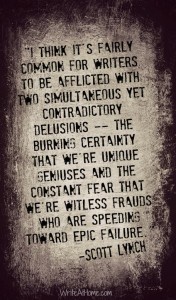 3. Published authors are just as insecure as unpublished authors.
3. Published authors are just as insecure as unpublished authors.
This is something that I didn’t understand until I started hanging out with lots of published authors. Basically, if you’re not neurotic, you are either not working hard enough or you are completely deluding yourself.
The fact is, you never really stop learning. Each book gets better. Each editor and agent teaches you something new. And the more you learn and the more you publish, the more you realize you really have no idea what you’re doing.
Writers also have short memories. Finishing a book that people will actually read and like begins to feel like a miracle, a sort of literary transubstantiation in which every garbage idea you had for the book comes out as a semi-coherent work of fiction. I don’t know an author who, when faced with the blank page at the start of the next book, doesn’t fear that they’re used up and will never write anything worthwhile again. I’ve taken to telling my friends to remind me this is how I feel at the beginning of every book, so when I freak out and threaten to quit writing all together, they can talk me down off the ledge. (It works with varying degrees of success, depending on the level of freak-out.)
The fact is this: pretty much every published author is deeply afraid the world will find out they’re a hack and their success has been nothing but luck—a conjunction of the planets, the result of an editor who accidentally acquired the wrong manuscript, or just a moment of complete insanity on the part of the publisher. And every single time a book comes out to good reviews (or even average reviews) it feels like a stay of execution, some breathing time to make ourselves into the image of what everyone perceives us to be.
4. Published authors aren’t distant because they’re stuck-up, they’re just really busy.
I once questioned an friend about why more published authors aren’t active with writer’s groups and conferences. She looked at me and said simply, “We just don’t have the time.” I didn’t understand until I’d been through the process (detailed in #2) how time consuming publishing really was, and that it entailed far more than just writing a book and turning it in. Add to the fact that it’s difficult to make a living at writing, and most authors younger than retirement age are working full time jobs and raising families as well. Even those of us who are fortunate enough to write as our full time jobs find it difficult to keep up with the demands of everyday life and still meet our obligations to our publishers.
So if you work up the courage to ask your favorite author if she will look at the first chapter of your manuscript and she says no, it is not personal. It’s just that authors receive so many requests of that sort, it would be impossible to get anything written should they comply. That said, I find many authors are giving of their time and expertise, and if you have a chance to sit down with a multi-pubbed writer for a few minutes at a conference and ask them questions, most are quite willing to give you their insights. Just be gracious and considerate of their time, and you will be surprised what you can pick up. I can honestly say my path wouldn’t have been as smooth without the benefit of my published friends’ experiences.
You can save yourself a lot of headache if you take advice from those who have already “made it” to heart. Which leads me to my last point:
5. Published authors never really feel like they’ve made it.
Okay, I think Stephen King, Nora Roberts, or John Grisham will admit that by any standard, they’ve achieved success. (I suspect they still think they’re hacks, as detailed in #3 above, but that’s different than feeling like you’ve made it.) The thing is, publishing is hard. There seems to be a crop of new and immensely talented writers coming up every year, and in this business you’re only as good as your next book. There’s always the threat of losing your spot in the catalog to someone new.
That threat pushes us to do our best every time (well, not that we need it – see #3 again), but it also makes you want to stop and enjoy the moment a little more rather than pressing on to the next project. At this moment, you are living the dream. At this moment, you love what you do. Tomorrow is not guaranteed for any of us—not life, not success. So rather than resting on our laurels, most of us just want to write the best book we possibly can and pray that it touches someone, somewhere, whether it’s in a deep and meaningful way or just a bright spot in an otherwise difficult day. After all, isn’t that why we write?
So, whether you are published or aspiring, know that you are not alone. There are legions of writers out there, feeling the same way you do, struggling through first drafts and praying that today, their best is good enough.
Published authors, what do you wish you’d known going into the business? Aspiring authors, what question would you want answered if you had the chance?
Tags: aspiring writers, competition, copyedits, deadlines, failure, fear, galleys, line edits, macro edits, published authors
Book Review: Dear Mr. Knightley/A February Bride
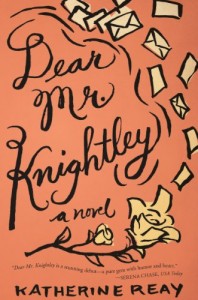 Dear Mr. Knightley by Katherine Reay
Dear Mr. Knightley by Katherine Reay
I read many books that I enjoy, but rarely do I find one that I love, that absorbs me so completely that I forgo all other responsibilities to finish it. Dear Mr. Knightley is not only charming, witty, and compulsively readable, but loaded with so much heart that it’s impossible not to get drawn into the narrative.
The story takes a set-up straight from a Regency novel: a mysterious benefactor calling himself Mr. Knightley offers a young woman a college scholarship in return for writing letters to assure him that his funding has been used for a good cause. The jaded and wounded Samantha Moore is just as skeptical as you would expect when faced with the deal. Over time, however, she is won by Mr. Knightley’s kindness, and her letters change from decidedly ungrateful and suspicious tone to trusting and confessional . As Sam witnesses true conditional love, she begins to soften towards those around her and realizes that her past does not have to define her.
Reay’s writing is smooth and accomplished, and the epistolary format creates an intimacy with the protagonist that is unusual in novels of this type. The development of the main character from a selfish, wounded girl who can’t drop her defenses long enough to be real with anyone around her to a mature woman who is able to give and receive love, is handled with the deftness of a much more experienced novelist. The secondary characters—Sam’s socialite friend who longs for acceptance as much as Sam, and fellow foster child, Kyle—are equally well-drawn. I’m not typically an emotional reader, but I found myself blinking away tears in a number of places.
The story works brilliantly as an allegory: I was sure we were meant to see Mr. Knightley’s patronage as a picture of God’s grace towards us, undeserved and often unwelcomed. Perhaps that’s why I found myself disappointed by the ending (no spoilers… you’ll just have to read and decide for yourself).
It’s been a long time since anything has held my attention that thoroughly, and I think there will be many more readers who love the wrap-up than dislike it. Dear Mr. Knightley is more than worth a try, and Katherine Reay is undeniably a novelist to watch. I’m looking forward to great things from her in the future!
About the Book
Sam is, to say the least, bookish. An English major of the highest order, her diet has always been Austen, Dickens, and Shakespeare. The problem is, both her prose and conversation tend to be more Elizabeth Bennett than Samantha Moore.
But life for the twenty-three-year-old orphan is about to get stranger than fiction. An anonymous, Dickensian benefactor (calling himself Mr. Knightley) offers to put Sam through Northwestern University’s prestigious Medill School of Journalism. There is only one catch: Sam must write frequent letters to the mysterious donor, detailing her progress.
As Sam’s dark memory mingles with that of eligible novelist Alex Powell, her letters to Mr. Knightley become increasingly confessional. While Alex draws Sam into a world of warmth and literature that feels like it’s straight out of a book, old secrets are drawn to light. And as Sam learns to love and trust Alex and herself, she learns once again how quickly trust can be broken.
Reminding us all that our own true character is not meant to be hidden, Reay’s debut novel follows one young woman’s journey as she sheds her protective persona and embraces the person she was meant to become.
*Thank you to Thomas Nelson for providing a free review copy via NetGalley.
A February Bride, by Betsy St. Amant 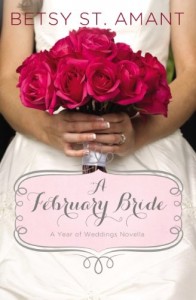
Betsy St. Amant is another “new to me” author, but after reading A February Bride, I will definitely take notice from here on. St. Amant has done something that I would have thought was near-impossible up until this point: write a fully developed, fully satisfying romance loaded with emotion in novella format. She wisely spends most of her page space developing the lies that the main character, Allie, believes about her worthiness (or lack thereof) to marry the man she loved… the lies that caused her to leave him at the altar in the first chapter. We also get a picture of how perfect they are for one another, so by the time we get to the HEA in the last chapter, we’re fully invested in their happiness. Smooth writing and a brisk pace makes this an easy choice if you’re looking for a sweet Valentine’s Day read. Highly recommended.
Preorder now! (Release date: January 28, 2014)
*Thank you to Zondervan for providing a free review copy via NetGalley.
About the Book
Allie left the love of her life at the altar—to save him from a lifetime of heartbreak. When a Valentine’s Day wedding brings them back together, she struggles against her family’s destructive history. Can Allie ever realize that a marriage is so much more than a wedding dress?
History repeats itself when Allie Andrews escapes the church on her wedding day—in the same dress passed down for generations and worn by all the women in her family—women with a long history of failed marriages. Allie loves Marcus but fears she’s destined to repeat her family’s mistakes. She can’t bear to hurt Marcus worse.
Marcus Hall never stopped loving Allie and can only think of one reason she left him at the altar—him. When the two are thrown together for his sister’s Valentine’s Day wedding, he discovers the truth and realizes their story might be far from over. Can Allie shuck expectation and discover who she is as a bride and in the Bride of Christ? And if she ever walks down the aisle, what dress will she wear?
*Thank you to Zondervan for providing a free review copy via NetGalley.
Tags: A February Bride, Betsy St. Amant, Dear Mr. Knightley, Katherine Reay, novella, romance

